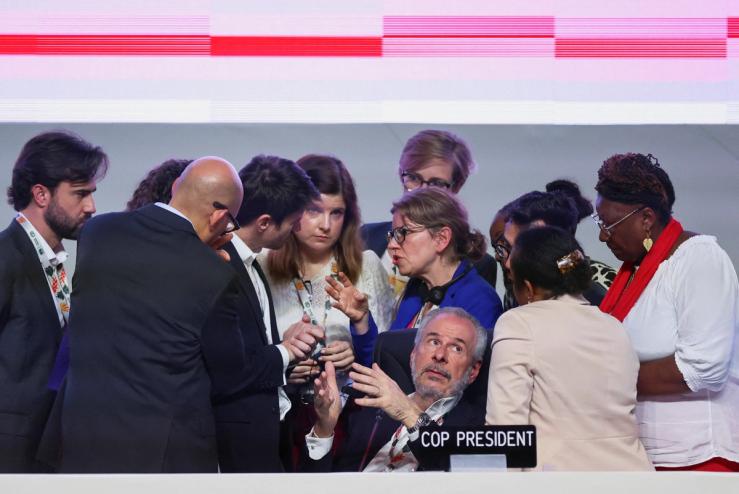The News
The COP30 climate summit in Brazil concluded Saturday without an explicit new international mandate to drive the global transition away from fossil fuels, but managed to piece together enough of a patchwork of alternative solutions that at least some of the most ambitious negotiators were able to call the talks a success.
“I would always love more,” the UK climate envoy, Rachel Kyte, told Semafor. “But… in the current geopolitical environment this is a big victory.”
In this article:
Tim’s view
The COP30 leadership had promised a summit that would focus on “implementation” — maturing from the phase of promise-making that has defined a decade of climate diplomacy since the landmark Paris Agreement into something more results-oriented.
Instead, what it seems to have delivered is mostly more plans to make plans. The decision, gaveled through on Saturday morning after all-night negotiations, calls for the creation of an “global implementation accelerator,” a voluntary initiative that will coordinate efforts by participating countries to improve their climate plans and report on progress at COP31 in Turkey next year. And the paragraph launching that initiative nods to the “United Arab Emirates consensus,” the document from COP28 in Dubai that contained the breakthrough commitment for countries to “transition away from fossil fuels.” André Corrêa do Lago, the summit president, also promised that Brazil will independently produce a “roadmap” detailing steps to transition away from fossil fuels, with input from energy companies and oil-producing nations, and co-host a conference on that subject in Colombia in April. The Belém decision does not, however, actually rearticulate the Dubai commitment, or make any mention of fossil fuels at all.
The best that can be said of the outcome is that it managed to avoid regressing on previous commitments. Given the US withdrawal from the process and the general geopolitical turbulence of the times, that’s no small feat. But the exclusion of the fossil fuel roadmap proposal from the consensus decision — which observers attributed to fierce opposition from Gulf nations, Russia, and India — shows that, after three decades of negotiations, countries still remain deeply divided on how to address climate change.
Irene Vélez Torres, acting environment minister of Colombia, told journalists in the conference hallway on Friday that COP’s consensus-based decision making had, once again, resulted in a deal that fell far short of what some officials had hoped: “What is being left behind is the most ambitious agenda. That has been eliminated.”
Michael Jacobs, senior fellow at the think tank ODI and a former climate advisor to the UK government, told Semafor, echoed that sentiment, arguing that even the proposed accelerator was overall “very weak” and much more vague than what Brazilian President Luiz Lula da Silva, the summit’s host, had called for. “No one thinks it’s the roadmap by another name,” he said. “The implacable opposition of Saudi Arabia, the United Arab Emirates, Russia, and India to any language here on transitioning away from fossil fuels reveals an increasingly bitter conflict at the heart of global climate politics.”
Ultimately, on fossil fuels, the summit made clear that the energy transition will be a fractured process that moves at different speeds in different geographies. It also made clear that the small number of governments that remain vehemently opposed to even mentioning the words “fossil fuels” in international negotiations may find themselves increasingly at odds with the transitions unfolding in their backyards — whether they want it or not.
“The formal outcomes of COP30 fell way short of what is needed and do not match the speed of transition in the real economy,” Maria Mendiluce, CEO of the We Mean Business Coalition, a private-sector advocacy group, said. “Nonetheless, those who put their line in the sand against a formal roadmap because of vested fossil fuel interests need to understand that blocking does not stop the transition, it simply lessens the chance to manage it in an orderly, equitable and fair way.”
Room for Disagreement
The two new plans — the accelerator and Brazil’s individual roadmap — “together are very powerful outcome,” Matt Webb, associate director for global clean power diplomacy at the think tank E3G, said.
And the deal does show progress on some other fronts: It sets a new target for adaptation finance, calling for it to be tripled to at least $120 billion per year by 2035, something that had been a top priority for developing countries but strongly resisted by the European Union. In a win for China, it also says that carbon tariffs and other trade-related measures to address emissions should not cause “arbitrary or unjustifiable discrimination or a disguised restriction on international trade.”
Notable
- COP30 may not have solved every problem facing climate politics, Heatmap’s Emily Pontecorvo writes, but it did at least succeed in refocusing the debate around how to solve them, rather than simply identifying them.


